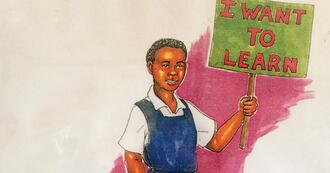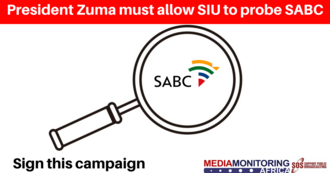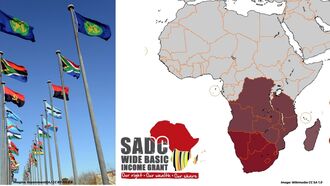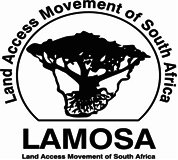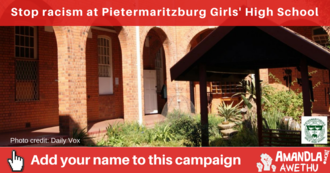- Featured
- Clean air
- Climate justice
- Consumer Rights
- Corporate Accountability
- Data access
- Early Childhood Development
- Economic fairness
- Education
- Electoral fairness
- Environmental justice
- Food justice
- Gender based violence
- Grants/social assistance
- Health
- Housing and infrastructure
- Industry interference
- Land Justice
- LGBTQIA+ rights
- Media/ information access
- Public transport
- Racism
- Reparations
- Safety
- Sanitation
- Service Delivery
- Sexual and Reproductive Rights
- Social justice
- Unemployment
- Womxn's rights/ gender equality
- Workers' rights
- More
-
Dangerous Animals on our streetsThere's a group of boys going around our streets in Atteridgeville with pitbulls in chains. These boys need to be stopped ASAP. Just last week a child was brutally bitten by one of their dogs. Though I'm not sure if the incident is tied to these boys but I highly suspect it's them. A few months back they were seen in Ramushu street setting their dogs to fight one of the neighborhood's small dogs. The dog annihilated the small dog and the puppy died on the spot with bloody guts all over the place. The boys ran off after the incident. The Animal Matters Amendment Act, 1993 (Act 42 of 1993) among others, provides that a court may make certain directions in respect of injuries caused by animals. Any person as a result of whose negligence an animal causes injury to another person, shall be guilty of an offence and liable on conviction to a fine or to imprisonment for a period not exceeding two years. A court convicting a person may make an order regarding the removal, custody, disposal or destruction of the relevant animal and the recovery of any costs incurred. As stated above, the owner of the dog is liable for compensating the victim for medical expenses, wage losses, pain and trauma suffered due to the injury. Medical expenses may include, but are not limited to: emergency medicine, plastic surgery, orthopedic surgery, hospital stay, antibiotics, X-Rays, CAT scans, physiotherapy and psychotherapy. South African laws states that dogs must be leashed unless confined in its home. If the dog was off the leash at the time of the attack, or was not compliant with the laws, the owner may be required to pay a higher penalty. Someone needs to stop these boys. They think they're in a rap video or something and putting our little brothers\sisters\sons\daughters in danger because once that dog grabs a small person, it doesn't let go till the person stops moving. This is something owners often train dogs to do. We need to create awareness about this and stop these boys ASAP. If you stay around Atteridgeville please share this and get the word out. It could be your family member that falls victim to their beasts.35 of 100 SignaturesCreated by Lesley Bopape
-
Dismiss Deputy Minister Mduduzi Manana for assaultSouth Africa is bogged by many incidents of assault against women to an extent that these have been normalised. Many women are killed, raped and brutalised by men on a daily basis, and yet very few are brought to justice for these crimes. Dismissing Deputy Minister Mduduzi Manana will be sending a loud and clear message that we condemn such behaviour. Deputy Minister Manana is a public figure, and as such, should know the high expectations of him. Keeping him in the employ of the government will undermine ongoing efforts to develop and implement a comprehensive, fully funded National Strategic Plan to prevent, combat and respond to GBV. Mduduzi Manana must be dismissed if we want to send a clear message that when you strike a woman you strike a rock. It's also worth noting that the Deputy Minister Mduduzi Manana led dialogues on Gender Based Violence [3]. Action against perpetrators of gender based violence must be swift, we have had enough of hollow words. It's time for action. Some have raised the point that victim of the assault called Mr Mduduzi Manana 'gay'. Such an utterance shows how homophobic Mzansi is, that calling someone gay is seen as derogatory and must be condemned. But equally, Mr Mduduzi Manana to be so offended by being called gay is also deeply problematic. But regardless, violence against women can never be justified. [1] https://www.timeslive.co.za/politics/2017-08-07-i-apologise-unreservedly-for-shameful-incident-at-cubana-mduduzi-manana/ [2] http://www.iol.co.za/news/politics/listen-deputy-minister-mduduzi-manana-confesses-to-slapping-woman-10669559 [3] http://www.dhet.gov.za/SiteAssets/Latest%20News/August%202016/Rhodes%20University080816.pdf2,881 of 3,000 SignaturesCreated by Amandla.mobi Member
-
Stop the Hate: #TransphobiaOnIdolsSAInjabulo Anti-Bulling Project (IABP) strongly condemns the transphobia perpetuated by Idols SA towards a contestant, Ashern Madlopha [1]. The actions of the judges perpetuate the prejudice, hostility, humiliation and hatred trans* people experience on daily basis. Furthermore, it undermines tireless work of many organisations fighting against transphobia. Most importantly, the judges’ actions undermine and violates Ashern’s rights to human dignity and freedom from inhumane and/or degrading treatment by people as enshrined in the Constitution of the Republic of South Africa (Act 108 of 1996). Despite South Africa’s progressive constitution, levels of transphobia and hate crimes remain alarmingly high. Trans* people are often more susceptible to mental health conditions due to victimization, social stigma, social exclusion, prejudice and other biases. According to the World Health Organisation (WHO), South Africa has the eighth highest suicide rate in the world, with 8 000 South Africans dying by suicide, yearly. The South African Depression and Anxiety Group (SADAG) reports that 23 000 people in South Africa die by suicide every day, while 460 people attempt suicide every 24 hours [2]. Considering the high levels of discrimination, exclusion and trauma experienced by trans* people, these rates are likely to be significantly higher among transgender communities in comparison to the general public. It is precisely the attitudes and behaviour of the Idols SA judges, host and producers that augments depression, anxiety and suicide rates in our transgender communities. IABP views transphobia and the silence surrounding it as a direct manifestation of the heteronormative patriarchal society we live in, pervaded with gender binaries, violence and authoritarianisms. As media personalities and people of influence, whom many young children admire, Idols SA’s, judges, producers and show host need to be held responsible for their behaviour. The show and its employees have a responsibility to promote inclusivity and respect diversity. Add your voice to take a stand against transphobia. Trans* rights and human rights. We cannot tolerate anyone mocking another person because of their gender identity. We have a social responsibility to protect trans* people. We need everyone in our communities and society to take a stand against transphobia, commit to actively address gender stereotypes, and treat everyone with love, dignity and respect irrespective of gender identity. Siyaphambili! | Forward Ever! *used to include all transgender, non-binary, and gender nonconforming identities. This petition is endorsed by Access Chapter 2. Access Chapter 2 is a NPO established in 2013, aimed at promoting human rights and the empowerment of women and LGBTI people, and initiating the participation of civil society organisations in governance and policy processes at local, national, regional and international level [3]. [1] https://twitter.com/IAmAFallist/status/891763417706614784 [2] http://www.enca.com/south-africa/world-suicide-prevention-day-hope-for-the-hopeless [3] http://www.ac2.org.za/301 of 400 SignaturesCreated by Injabulo Projects Injabulo Anti-bullying Project
-
UKZN Council and Executive must protect arrested students of UKZN PMBFrom 4 August 2017, we – the Arrested Students of UKZN-Pietermaritzburg – will stand trial as protestors of #FeesMustFall. Society applauds the youth for re-awakening the country to ongoing social injustice and inequity. The University agrees with free higher education and recognises the right to protest, yet they are not protecting us. If the courts try us, and find us guilty, we are the ones whose dreams and lives will be shattered. For the record; We DO support #FeesMustFall. We DO stand up for our rights and the rights of all South Africans. We DID help to build the ongoing broad movement for social justice in South Africa even after UKZN took out an interdict prohibiting us from freely doing so which means we are primarily charged with contempt of court among other charges. We are randomly accused for being generally a part of the climate at the time. We DID NOT burn buildings. We DID NOT assault anyone. While our University prides itself for being a transformative university that supports free higher education, those in authority are washing their hands of our fate. While the adults of society have the economic, institutional and legal power to protect us as the young of the society, they are instead looking away and doing nothing. If we are charged we will be blighted for life. Instead of emerging from university as graduates helping to make our society better, we will be branded as criminals that will make our degree status useless.280 of 300 SignaturesCreated by lihle mkhize
-
Stop the Somerset Precinct RezoningThe Western Cape Provincial Government has submitted an application to have the land rezoned from Community Open Space and Open Space to General Business 6. This would allow for general business activity, such as restaurants, shops and office spaces in tall buildings. In terms of spatial planning and land use law (any building or development must take place in-line with these laws), the City of Cape Town, is the authority that must either: • Accept the application • Reject the application • Accept the application with conditions attached. Furthermore, there are a number of things that are wrong with the proposed development, namely: 1. Little public benefit The proposed development prioritises the economic value of the land over its social value. As a result, the proposed plan paves the way for the site to be privatised with very little public benefit. The Provincial government is treating this prime piece of public land just like a for-profit private developer would. 2. A step backwards The regional hospital is moving from the site and will be replaced by a small community day clinic (2500m² in size). This represents a significant step backwards in terms of the public benefit that Provincial government’s most expensive piece of land will provide. 3. The plan is vague The plan does not give enough detail, which means that the City will not be able to understand the full impact that the development would have. 4. Too little affordable housing The plan says that it will include ‘at least 300 affordable housing apartments’. Research by local and international experts found that the Tafelberg site in Sea Point could fit 316 affordable apartments together with 120 market-rate apartments. The Tafelberg site is six times smaller than the Somerset Hospital Precinct, which shows that the development proposal is not serious about providing a decent amount of affordable housing The other big problem is that affordable housing is not defined. Who will it be affordable for? At the end of the day much more housing can go onto the site – this is not realising the full potential of the site for poor and working class people. 5. Broken promises Helen Zille and her Cabinet ‘promised’ that the land would be released on the specific basis that as much affordable housing as possible must be included. 6. Business as usual Since the beginning of democracy there hasn’t been a single subsidised housing unit created in Cape Town’s inner city and surrounds. Cape Town’s spatial apartheid remains unchanged. The Somerset Hospital is perhaps the most important piece of publicly owned land for addressing spatial apartheid in Cape Town’s inner city, and this decision will have enormous impacts on South Africans for generations to come. This development proposal shows that Helen Zille’s government remains uncommitted to achieving spatial justice in Cape Town and that it has been captured by a style of exclusive property development for the rich. The main idea of the development is to generate funds from the site to pay for social amenities ‘elsewhere’. This approach to the development of well-located public land ensures that ownership, occupation and use of central city land remains only in the hands of the rich. This corrupted approach entrenches spatial apartheid and contradicts provincial Government’s own policies. 7. Zille’s Rogue Department of Transport of Public Works The applicant is the Western Cape Government’s Department of Transport & Public Works, through the Regeneration Programme – a programme aimed at developing strategic pieces of Provincially owned land. Despite spending millions of Rands on consultants and repeated studies, the programme has still not broken ground on a single site since it was established 7 years ago. This is the same government department that has to date never handed over any Provincially owned land to the Department of Human Settlements. This is the same programme that attempted to unlawfully sell the Tafelberg property in Sea Point, even though the Department of Human Settlements requested the site to develop affordable housing. Tafelberg was sold to help pay for a R1,2 billion office block for Provincial government. This is the same programme where Gary Fisher was both a senior public official responsible for land disposal and a private property investor and developer. Despite these serious conflicts of interest, there has still been no investigation. 8. De Lille rolls out red carpet for spatially violent developments By law, the City of Cape Town must consider the principle of spatial justice. The City can place conditions that have to do with to the social impact of any development – whether on public or private land. The Mayor, Patricia de Lille can require any development to include some affordable housing. However, she has never used this power before because she believes land is for profit not for people!346 of 400 SignaturesCreated by Amandla.mobi Member
-
Place children with disabilities in schoolsThe South African Schools Act says that the governing body of a public school must determine the admission policy of that school. While this is the case, schools still turn away learners due to their disabilities and special needs [1]. The Act further says that no learner should be put on the waiting list; their names are supposed to be placed on a central database if schools cannot accommodate them. It also states that all children between the ages of 5 and 15 have to go to school, this includes children with disabilities and special needs. The Constitution, the National Development Plan, the Sustainable Development Goals, and the Incheon Declaration of the World Education Forum all confirm that the state has a commitment to provide schooling for children with disabilities. The Department of Basic Education needs to ensure that the Act is adhered to, and that governing bodies do not violate the children's rights to an inclusive and special education. [1] Disabled and out of school, Stephanie Kelly for Groundup News. 13 June 2016.49 of 100 SignaturesCreated by Amandla.mobi Member
-
Probe the SABC now! Hon Pres Zuma sign the SIU proclamationThe proclamation, which has been ready since May, will enable the interim board to begin to unpack the extent of fraud, irregularities, and wasteful, fruitless expenditure at the SABC. The SIU investigation is a critical component in the process of restoring the SABC, holding wrongdoers accountable and recovering monies due to the public broadcaster. According to the ad hoc committee report [1] on the inquiry of the SABC released in February this year, the SABC has deviated from its mandate as the public broadcaster. During his tenure as the SABC’s GCOO, Hlaudi Motsoeneng flouted several governance rules, codes and laws, including judgments from the courts and ICASA. Hlaudi’s mismanagement and abuse of power has resulted in a public broadcaster that is financially unsustainable and has compromised the editorial integrity of the SABC. Furthermore, in 2013 the SABC and MultiChoice signed a R533m contract to give the pay-TV company the right to air two of the public broadcaster’s channels. In December 2016, it was revealed that, after the deal was contract in 2014, the SABC’s Hlaudi Motsoeneng scored an alleged R33m bonus, R11.4m of which he has already been paid [2]. As it stands, the interim board only has two months left before the end of its tenure, and this SIU investigation is central to the work that it has been commissioned to do. It is unacceptable that at this stage in the process, the President still hasn’t signed the proclamation. The need for a reliable and accurate public broadcaster cannot be overstated in a country like South Africa, where a substantial number of people receive their information primarily through the broadcast media. This means that broadcast news may be the only media which is accessible for the majority of South Africans. A dysfunctional SABC, therefore, prevents us from truly protecting and enhancing the fundamental rights of all citizens to freedom of information. * http://www.soscoalition.org.za/media-release-mr-president-just-sign-the-proclamation/ [1] https://pmg.org.za/page/https://pmg.org.za/tabled-committee-report/2898?via=homepage-feature-card [2] SABC, Multichoice deal must be probed - leaked Parliamentary inquiry document, Thulani Gqirana for News24. 18 January 2017.880 of 1,000 SignaturesCreated by Lerato Motaung
-
End Poverty in SADC with a Basic Income GrantA basic income grant will provide families with assistance to send their children and young girls to school, access to opportunities that will end generational poverty traps, increase basic education as a priority and achieve greater gender equality. The introduction of a universal cash transfer, predominantly funded through extractive industries, will be a remarkable stride towards poverty eradication, reduced inequalities among Africans, equal economic participation and overall African unity. The SADC BIG amount will be US$15 per person, per month on introduction and should be inflation indexed. A functioning social protection system that embeds basic income as a fundamental human right to the benefit of all who reside on the continent should not be reduced to hand-outs to the poor, but rather conceptualised and accepted as a developmental policy mechanism to promote economic justice, reduce poverty and inequality and stimulate human and economic integration, as well as harness social cohesion across our porous regional borders. Examples of social grants in countries such as Namibia, South Africa and Malawi have shown the importance of alternative social protection initiatives such a SADC Basic Income Grant (BIG) to tackle poverty. The SADC BIG Coalition shares a common vision to eradicate poverty and reduce inequality in SADC and promote the roll out of social protection in the region in accordance with the SADC Social Charter. This will enable the continent’s poorest households to better meet their basic needs through providing everyone with a minimum level of income thus affirming and supporting the inherent dignity for all.208 of 300 SignaturesCreated by Advocacy Officer

-
Scrap the MPRDA Act of 2002 and its amendmentsThe MPRDA of 2002, even though it was later amended, still does not afford any opportunity for consultation with and consent by communities as prescribed in Free Prior and Informed Consent(FPIC). This infringes on the rights of communities to influence decisions about old and new mining in their areas. It contains limited rights on community consultations (It only addressed mitigation of environmental impacts). Communities are still not given space to negotiate the contents of the old and new rights. The MPRDA of 2002 also separates the surface rights from the mineral rights, and converted old order rights of mining companies to mine on communal land to new ones without consulting communities to listen to their views. The Act states that the conversion is automatically granted for as long as the company can show that it has a Black Economic Empowerment (BEE) partner and that the Municipality has agreed to a social labour plan providing for housing and local economic development plans. Once this has been checked, new mining can happen without any consent by the community. All that is required under section 5(a) is a 21 days written notice before mining commences. This cannot be right.1 of 100 SignaturesCreated by Land Access Movement of South Africa
-
Protect Customary Land RightsThe Constitution recognises the informal or customary rights of people living in the former homelands yet the Department of Rural Development and Land Reform has failed to legislate a communal land rights law that will strengthen and protect these rights. As a result; * Big cooperates are grabbing land in the communal land without any compensation for loss citing development. * Nature of individuals and family rights within a broader community are not clarified, and overshadowed by majority in the community. * People are not adequately compensated when land is sold or awarded for big developments * Consultation and Consent of land occupiers is not respected because of the weak nature of the rights provided by current law. In 1996, Parliament passed the Interim Protection of Informal Land Rights Act (IPILRA) to provide protection for all people living on communal land in the former Bantustans, people living on trust land, people who previously had Permissions to Occupy (PTOs) and anyone living on land uninterrupted since 1997 “as if they were the owner”. This was a big milestone in the protection and recognition of customary land rights and the empowerment of families to be part of bargaining and negotiations of any socio-economic development happening in their land. Although people are protected by IPILRA, the fact that it is temporary and can be renewed annually, deprives people of their rights to say NO to development that disadvantages them. This makes it easy for "developers" or Government to easily expropriate the land. It is also worth noting that the law also states that the Minister of Rural Development and Land Reform can make regulations in terms of IPILRA to provide more detailed processes and procedures.83 of 100 SignaturesCreated by Alliance for Rural Democracy
-
Stop the Traditional Leadership and Khoisan Bill as it currently stands.Any law that seeks to facilitate recognition of previously marginalised group or any development of land belonging to the people must ensure that community consultation and consent is at the centre. The TKLB closes down that space and excludes ordinary people from being consulted and give consent on decisions that will affect their lives. There needs to be meaningful public participation. As it stands, the TKLB only highlights consultations with high profile structures such as the House of Traditional Leaders, royal families and traditional councils and there is no mention of rural citizens who are land buyers and customary land rights users. The TKLB supports rural elites' access to wealth and resources. It does not put in place mechanisms that holds leaders accountable to their people. The discovery of mineral wealth in the land that was once considered dry and not productive has brought about disputes where people’s peace is disrupted by big mining companies, and when people react they are suppressed and criminalized.26 of 100 SignaturesCreated by Alliance for Rural Democracy
-
PMB GHS, act against racismRacism should not be tolerated, ever. There is no excuse. Real and permanent changes must be made. Read more about the incident here: https://www.thedailyvox.co.za/racism-thrives-at-pietermaritzburg-girls-high-school-ndapwa-alweendo/1,268 of 2,000 SignaturesCreated by Zama Nzimande
.png)

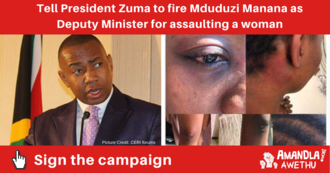.png)

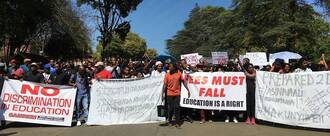
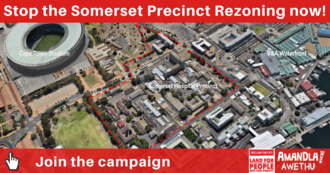.png)
